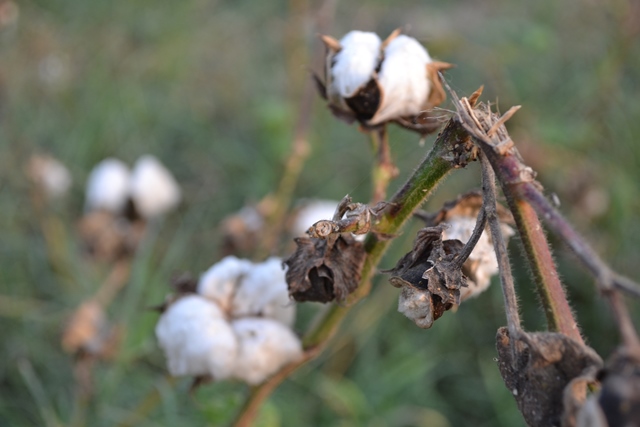AZRA TALAT SAYEED
NEWSPAPERS have been rife with reports about a pink bollworm attack on the cotton crop this year. The scenario is indeed disastrous on many accounts.
Of course, the very first thing to be destroyed is the livelihood of the country’s millions of small farmers.
With cotton being a major cash crop, millions rely on its harvest for a sizable portion of their income. In fact, they go heavily into debt to not only buy the cotton seed but also expensive inputs like fertilisers and multiple pesticides that are sprayed on cotton. Without these, the seed cannot yield a good harvest.
According to small farmers from Multan and Sahiwal, nearly 90pc of the cotton crop has been destroyed. For farmers in Multan who sowed on leased land, the per-acre loss is approximately Rs40,000. And the loss for those who have their own land runs to about Rs20,000.
Another critical point is the amount of pesticides that have been used on the cotton crop this year. A newspaper advisory from the government mentions the ‘correct’ use of pesticides that farmers should be applying on the beleaguered cotton crop. This is indeed ironic, as one major selling point of Bt cotton is its ability to ward off pest attacks. But the attack of pink bollworms this year has at least put this claim to rest.
There are farmers who also feel that the crop’s failure will be beneficial for the gigantic seed corporations that thrive on their expensive patented seeds.
According to a farmer from the Pakistan Kissan Mazdoor Tehreek, this could be a golden opportunity to push farmers to switch from cotton to corn. Corn is used for making ethanol. Pioneer, an American company, has also been promoting the use of certain branded corn varieties that are used for animal feed.
The animal dung from animals fed these corn varieties yield higher urea content and is considered a good source of biogas. But one has to yet see whether the patented hybrid corn seeds will turn out to be a boon or bane for Pakistan’s agriculture sector.
What is the cost of these branded seeds? Hybrid corn seeds of Pioneer, Syngenta and Monsanto are priced at Rs5,500-6,000 per 10kg; it takes about 10kg of seeds for per-acre sowing. The ‘beauty’ of these seeds is that none of them give seed for next year’s cultivation. Hence, the farmers have to buy new batches of seed every year.
That is the crux of the matter for the agro-chemical and biotechnology firms. No doubt, the ‘commodification’ of natural resources is a key strategy of market-driven forces.
At the moment, all cotton seeds in the market are being sold without trademarks. The price of 1kg of cotton can vary from Rs300 to Rs1,500. If women sow seed by hand, then at least 3kg is needed; if seed drills are used, then 5-8kg is required.
So if patented cotton seed, particularly the genetically modified Bt variety, is introduced next year (a major reason for the passing of the Amended Seed Act 2015), then there is no doubt that seed prices will jump.
The cotton crop’s failure this year can be exactly the kind of situation that benefits multinational corporations: it will now be argued that substandard seed is the cause of the current catastrophe.
However, it needs to be pointed out that Bt cotton has suffered a similar fate in India, where this seed is heavily protected under patents. The Nagpur-based Central Institute for Cotton Research has confirmed the pink bollworm’s resistance to Monsanto’s second generation biotechnology protection Bollgard-II in some parts of Indian Gujarat.
Meanwhile, our textile industry will face a further setback when it is unable to find cotton for local production. According to some newspapers, the All Pakistan Textile Manufacturers Association and the Pakistan Cotton Ginners’ Association are advocating for the import of Bt cotton seeds supported by Monsanto.
At the same time, Pakistan is increasing its sugarcane harvest to produce more ethanol. According to the OECD-FAO Agricultural Outlook, Pakistan increased its ethanol production from 97.2m litres in 2004 to 321.8m litres in 2014.
Based on media reports, much of the ethanol in the country is being sent to Europe. Do our farmers want to be energy suppliers to the oil-guzzling vehicle industry in the northern hemisphere? What about food for our own people?
azra.sayeed@gmail.com
Published in Dawn, Business & Finance weekly, November 23rd, 2015

